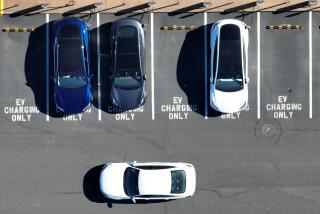Keeping it clean
- Share via
Those hoping that a Democratic Congress and administration would make progress on clean energy this year have been deeply disappointed. Not only was the House’s cap-and-trade climate bill crushed in the Senate by unified GOP opposition, but even a modest bipartisan effort to set a national standard for renewable power generation fell by the wayside. Now, one of the federal government’s few existing clean energy programs — grants for wind and solar developers approved as part of the 2009 stimulus package — may end in the coming weeks unless the lame-duck Congress acts.
The renewable power subsidies, known as “1603 grants” after the section of the stimulus bill that created them, paid up to 30% of the cost of projects breaking ground by the end of this year. Renewable facilities generating a combined 4,250 megawatts (the equivalent of roughly four large nuclear plants) were supported by the program as of March, according to a report by Lawrence Berkeley National Laboratory; that output is doubtless far higher now. The grants have created thousands of jobs, and helped clean the air and wean the country off fossil fuels. But all that may be about to stop.
Last week Democrats submitted their solution to the problem of the soon-to-expire Bush-era tax cuts, proposing to extend them only for those making less than $250,000 a year. An extension of the 1603 grants was included in that bill, which stalled after it failed to meet the Senate’s 60-vote threshold to avoid a filibuster. When the Obama administration negotiated a compromise that extended the tax cuts for all Americans, the grants were stripped out, apparently because of GOP opposition to a continuation of stimulus programs.
The government already gives a tax credit to developers of renewable energy projects, but after the banking crisis, when investment in such projects dried up, the credit was rendered next to useless. That’s why the grants remain so crucial; the investment climate has improved very little, and without the grants it is likely that construction of clean power plants would stall. That would ravage fledgling manufacturers of such components as wind turbines and solar panels, putting U.S. green technology companies at a profound disadvantage to their competitors in China and Europe, where leaders take the threat of climate change seriously.
Both of California’s senators are working hard to restore the renewable power grants to the tax-cut package, whose details are still the subject of furious debate. The grants are boosting economies in many red states such as Texas, and GOP senators who cling to the party line aren’t doing their constituents any favors. Whatever deal is reached on taxes, the grants should be part of it.
More to Read
Get the L.A. Times Politics newsletter
Deeply reported insights into legislation, politics and policy from Sacramento, Washington and beyond. In your inbox three times per week.
You may occasionally receive promotional content from the Los Angeles Times.










